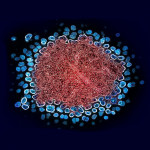A small Bay Area program that provided complete daily meals and snacks to low-income individuals with HIV, diabetes or both conditions saw antiretroviral (ARV) adherence rates rise and the overall rate of depression drop.
Publishing their findings in the Journal of Urban Health, researchers conducted a study of 54 participants, including 23 with HIV, 24 with type 2 diabetes and 7 with both HIV and type 2 diabetes. For six months, the participants received meals and snacks they picked up twice a week that included 100 percent of their daily caloric requirements, were based on the Mediterranean diet and were low in refined sugars and saturated fats.
The participants picked up their food 93 percent of the time.
The food cost $6.58 per day per person.
The rate of very low food security among the participants decreased from 59.6 percent at the study’s outset to 11.5 percent at the end of follow-up. The participants consumed less fat and more fruits and vegetables during the study. Diabetics consumed less sugar.
The rates of depression and binge drinking dropped among the participants as a whole. Also, fewer participants sacrificed food for health care by the end of the study.
Among the HIV-positive participants, the proportion who adhered to their ARVs at a rate of at least 95 percent increased from 47 percent to 70 percent.
The researchers are planning a six-month follow-up study with 200 HIV-positive individuals in San Francisco and Alameda counties.
To read a press release about the study, click here.
To read the study abstract, click here.







Comments
Comments